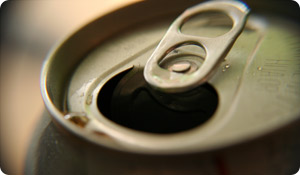
Diet sodas have long been encouraged as a "free food" on many weight loss plans and are a staple for many people with diabetes. Now researchers are saying this sweet treat may be hurting some of the same people it's supposed to help.
Since 1976, more than 200,000 female nurses have volunteered to participate in the Nurses' Health Study (NHS) at Brigham and Women's University in Massachusetts. This ongoing research project was originally designed to study links between oral contraceptives and smoking and the risk of developing major illnesses, but the collection of massive amounts of information on diet, exercise and other lifestyle factors has yielded valuable insight into the effect of many different lifestyle choices on the development of heart disease, diabetes, and other health conditions that affect women.
A look at the diet soda habits of more than 3,000 older women chosen from the NHS has revealed a link between artificially sweetened sodas and a weakening of kidney function over the course of a decade.
Kidney function- how well the kidneys perform their job of filtering blood, excreting waste and maintaining the body's fluid balance-normally declines slightly with age. These findings from the NHS revealed that women who drank two or more glasses, cans or bottles of diet soda every day were twice as likely to experience a significant decline.
Interestingly, a study present earlier in 2009 at the American Urology Association's annual meeting suggested that diet soda might be good for kidneys because they contain citrate and malate, substances that create a more alkaline environment in the body, which helps dissolve and prevent the formation of calcium kidney stones. Since kidney stones result, at least in part, from dehydration, however, the recommendation for people who form stones is to drink more water, not more diet soda.
Nor is the answer to turn back to sugar-sweetened sodas. In addition to an excess of "empty" calories (calories with no accompanying nutrients) from sugar, previous studies have linked regular sodas with increased protein in the urine, which can be an early indicator of kidney disease.
While health experts have never said "never" when it comes to drinking either sugar-sweetened or artificially sweetened sodas, most agree that both types are consumed in excess. And that, they say, is the real problem.
In a retrospective study based on surveys of eating habits, such as the NHS, researchers cannot pinpoint the ingredient in diet sodas that affects kidney function. But since diet sodas are known to be higher in sodium than sodas made with sugar, and excess sodium has long been associated with kidney disease, sodium is certainly suspect, along with artificial sweeteners. Consider these findings a jumping off point for further research to reveal what, specifically, we need to know about the effects of drinking too much diet soda.
Sources:
Science Daily: Diets High in Sodium and Artificially Sweetened Soda Linked to Kidney Function Decline:
http://www.sciencedaily.com/releases/2009/11/091101132543.htm
Science Daily: Drinking Diet Soda May Reduce Risk of Forming Kidney Stones:
http://www.sciencedaily.com/releases/2009/04/090426075452.htm
Brigham and Women's Hospital: Nurses' Health Study
http://www.brighamandwomens.org/publicaffairs/NursesHealthStudy.aspx





